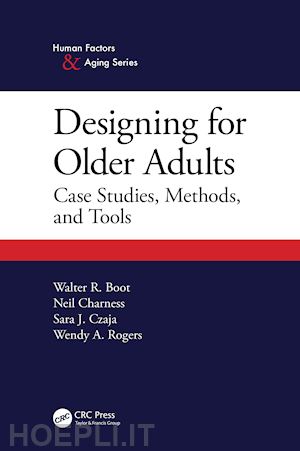Walter R. Boot Ph.D., is a Professor of Psychology at Florida State University and director of the university’s Attention and Training Lab. He received his Ph.D. from the University of Illinois at Urbana-Champaign in Visual Cognition and Human Performance in 2007. Walter is one of six principal investigators of the multi-disciplinary Center for Research and Education on Aging and Technology Enhancement (CREATE), a long-standing and award winning National Institute on Aging funded center dedicated to ensuring that the benefits of technology can be realized by older adults. He is also Co-Director of the ENHANCE (Enhancing Neurocognitive Health, Abilities, Networks, & Community Engagement) Center, funded by the National Institute on Disabi Walter R. Boot Ph.D., is a Professor of Psychology at Florida State University and director of the university’s Attention and Training Lab. He received his Ph.D. from the University of Illinois at Urbana-Champaign in Visual Cognition and Human Performance in 2007. Walter is one of six principal investigators of the multi-disciplinary Center for Research and Education on Aging and Technology Enhancement (CREATE), a long-standing and award winning National Institute on Aging funded center dedicated to ensuring that the benefits of technology can be realized by older adults. He is also Co-Director of the ENHANCE (Enhancing Neurocognitive Health, Abilities, Networks, & Community Engagement) Center, funded by the National Institute on Disability, Independent Living, and Rehabilitation Research, with a focus on how technology can support older adults living with cognitive impairment. His research interests include how humans perform and learn to master complex tasks (especially tasks with safety-critical consequences), how age influences perceptual and cognitive abilities vital to the performance of these tasks, and how technological interventions can improve the well-being and cognitive functioning of older adults. He has published extensively on the topic of technology-based interventions involving digital games. Walter is a Fellow of the American Psychological Association (APA) and the Gerontological Society of America, and received the Springer Early Career Achievement Award from Division 20 (Adult Development and Aging) of APA in 2014, and the Earl A. Alluisi Early Career Achievement Award from Division 21 (Applied Experimental and Engineering Psychology) of APA in 2017. Neil Charness, Ph.D., is William G. Chase Professor of Psychology, Director of the Institute for Successful Longevity, and Associate Director of the University Transportation Center (Accessibility and Safety for an Aging Population, ASAP) at Florida State University. He received his BA from McGill University (1969) and MSc and Ph.D. from Carnegie Mellon University (1971, 1974) in Psychology. Prior to coming to Florida State University he was on the faculty at Wilfrid Laurier University and the University of Waterloo in Canada. Neil’s current research focuses on human factors approaches to age and technology use, interventions to promote improved cognition, and aging driver and pedestrian safety. He is a Fellow of the American Psychological Association (APA), the Association for Psychological Science, and the Gerontological Society of America. He received the Jack A. Kraft Innovator award (with CREATE colleagues) from the Human Factors & Ergonomics Society (2013); the Franklin V. Taylor Award for Outstanding Contributions in the field of Applied Experimental and Engineering Psychology from Division 21 of APA (2016); the M. Powell Lawton award for Distinguished Contribution to Applied Gerontology from Division 20 of APA (2016), the APA Prize for Interdisciplinary Team Research with CREATE colleagues (2016), was honored as a Grandmaster of the International Society for Gerontechnology (2018), and received APA’s Committee on Aging award for the Advancement of Psychology and Aging (2018). Sara J. Czaja, Ph.D., is the Director of the Center on Aging and Behavioral Research in the Division of Geriatrics and Palliative Medicine at Weill Cornell Medicine. She is also an Emeritus Professor of Psychiatry and Behavioral Sciences at the University of Miami Miller School of Medicine (UMMSM). Prior to joining the faculty at Weill Cornell, she was the Director of the Center on Aging at the UMMSM. Sara received her Ph.D. in Industrial Engineering, specializing in Human Factors Engineering, at the University of Buffalo in 1980. She is the Director of CREATE. Her research interests include: aging and cognition, aging and healthcare access and service delivery, family caregiving, aging and technology, training, and functional assessment. She has received continuous funding from the National Institutes of Health, Administration on Aging, and the National Science Foundation to support her research. She is a fellow of the American Psychological Association (APA), the Human Factors and Ergonomics Society (HFES), and the











